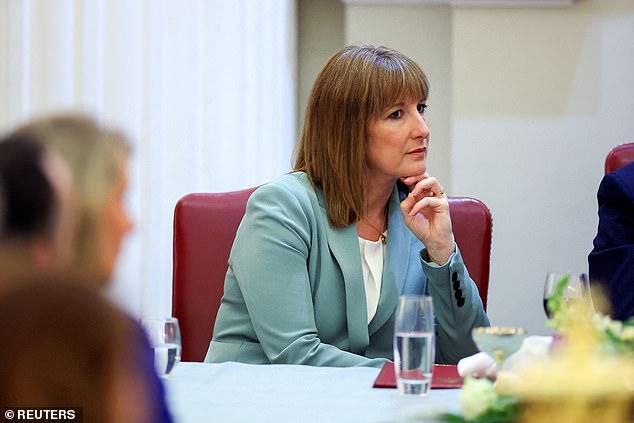Rachel Reeves has confirmed she will deliver the Autumn Budget on 26 November 2025.
Markets had widely expected that, after a summer of speculation, the Chancellor would deliver her second Budget in October as she did last year.
While a late November budget isn’t implausible – Philip Hammond made one on 22 November 2017 for example – it is unusual and signals the Treasury is delaying in the hope of better news in the coming weeks.
Now that the date is announced, the Office for Budget Responsibility can begin to assess the UK’s financial health and how much headroom Reeves has to work with.
Given the Bank of England’s recent gloomy assessment and how stubborn inflation is proving, Reeves may want to wait until after the central bank’s 6 November meeting, when they could make another rate cut.

Market rout: Reeves has confirmed the date of the Budget but it’s unlikely to settle markets
Jason Hollands, managing director of Bestinvest, also suggests a later date means Reeves ‘isn’t wholly in control of its contents’.
On Monday, it was confirmed that Reeves had brought in her left-wing colleague Torsten Bell to help with Budget preparation.
Bell, who previously worked for Labour figures Alistair Darling and Ed Miliband, ran the Resolution Foundation think tank, which proposed the triple lock be scrapped and inheritance tax be overhauled, among other ideas.
Mr Hollands adds: ‘It seems clear from the beefing up of economic advisers next door at Number 10 this week, that the Prime Minister will want to be much more involved in shaping decisions this time round.
‘Another month will therefore extend the period to thrash things out between Reeves’s team and those advising Keir Starmer.
‘He will surely want to avoid the kind of u-turns we saw on Winter Fuel and benefits reform when he faced a backbench revolt.’
Finally, the Chancellor may hope that a delay to the Budget could help to calm the bond markets, which have seen a huge sell-off this week and therefore pushed up the price of government borrowing.
The 30-year gilt yields reached their highest level since 1998 this week, which Hollands says is ‘a sign that markets are becoming more demanding when it comes to lending to the UK Government’.
What a late Budget means for your money
While gilt yields have come back down today, now that the Budget date is confirmed, it is unlikely to put already jittery markets at ease.
‘Investors should expect yields to be quite skittish, dependent on upcoming data, rate decisions and speculation over the coming months,’ says Hollands.
While it’s bad news for investors, it could spell even more trouble for homeowners and savers.
While the rise in 30-year gilt yields will have little impact on two and five-year mortgage pricing, a trickle-down effect could mean rates continue to rise.
We explain how mortgage pricing works here.
Rising gilt yields are a sign that the market thinks inflation is back on the rise, and therefore that the base rate will need to stay higher for longer.
While this might benefit savers on the surface, experts say that rates are unlikely to rise.
The lack of fiscal headroom and Labour’s promise not to raise rates of income tax, NI and VAT, means speculation will be rife over the next three months.
Already, the Government has made it clear that it wants to impose higher taxes on wealthier people, including on their properties.
There have been rumours that there could be changes to council tax, capital gains tax and stamp duty.
Further changes to inheritance tax, including how much people can gift to their friends and families, could also be on the cards.
Households will be left to decipher what is likely to be targeted in the Budget, and they risk delaying decisions to their detriment and grapple with higher costs.
‘Markets and savers alike dislike being left in the dark, and it is little wonder we’ve seen a surge in queries around pensions taxation, estate planning, and whether it remains worthwhile to hold on to buy-to-let properties amid growing speculation,’ says Rebecca Williams, financial planner at Rathbones.
‘But while it is sensible to keep an ear to the ground, it is important to remember that headline announcements grab the spotlight while quieter changes – such as freezes to allowances – can be just as impactful over time.
‘Whatever the shape of the Chancellor’s statement, it remains good practice to avoid knee-jerk reactions based on rumour.’
SAVE MONEY, MAKE MONEY

Sipp cashback

Sipp cashback
£200 when you deposit or transfer £15,000
4.38% cash Isa
4.38% cash Isa
Trading 212: 0.53% fixed 12-month bonus

£20 off motoring

£20 off motoring
This is Money Motoring Club voucher

Up to £100 free share

Up to £100 free share
Get a free share worth £10 to £100

No fees on 30 funds

No fees on 30 funds
Potentially zero-fee investing in an Isa or Sipp
Affiliate links: If you take out a product This is Money may earn a commission. These deals are chosen by our editorial team, as we think they are worth highlighting. This does not affect our editorial independence. Terms and conditions apply on all offers.
#Budget #late #November #money


